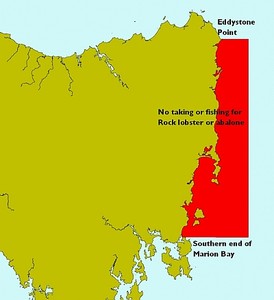Emergency closure- Recreational rock lobster and abalone fisheries
by DPIPWE on 22 Nov 2012

SW
This is a special news broadcast regarding the emergency closure of an area of the recreational rock lobster and abalone fisheries from the Recreational Fisheries Section of DPIPWE.
A public health alert against eating wild shellfish from the east coast of Tasmania has been extended, after test results showed that two other types of seafood are being impacted by a toxic species of algae.
People have been advised not to eat wild shellfish from the east coast - from Marion Bay through to Eddystone Point.
Testing has now indicated that the paralytic shellfish toxins involved are also present above safe levels in the guts of both rock lobster and abalone, and the health alert now also applies to these species.
Do not eat the gut of rock lobster or the gut of abalone taken from the east coast of Tasmania between Marion Bay and Eddystone Point, or recreationally-harvested oysters, clams or mussels.
The flesh of these species is safe to eat provided all gut residues are removed and thoroughly washed off.
As a precaution, do not eat periwinkles, sea urchins or crabs from this section of the coast.
The Director of Public Health, Dr Roscoe Taylor, said that while the toxic algal readings are very low, a health alert is necessary.
'It is important to understand that it can take some time for toxins to purge, and purging rates vary between species, so we will be continually testing the toxicity of the affected seafood from these waters,' Dr Taylor said.
Commercial wild catch and aquaculture shellfish resources in the affected area continue to be monitored and closures apply where assessed necessary on the basis of risk.
Dr Taylor said that such closures ensure the Tasmanian produce we buy in shops or export remains safe to eat and maintains its reputation of high quality.
In response to the public health risks identified in relation to abalone and rock lobster on the section of the east coast in question, the Minister for Primary Industries and Water is moving to also close the recreational abalone and rock lobster fisheries between Eddystone Point and Marion Bay.
Dr Taylor urged Tasmanians not to eat the seafood listed from the affected area in the following list because the toxins from the algal bloom could cause Paralytic Shellfish Poisoning.
'Symptoms include tingling in the mouth and extremities, pins and needles, unsteadiness on the feet, weakness of the arms or legs and nausea. Anyone experiencing these symptoms after eating wild seafood from or near the affected area should seek immediate medical attention.
'Paralytic Shellfish Poisoning is rare but it is still important that Tasmanians follows our advice so they do not get sick,' Dr Taylor said.
Do not eat the following wild harvested seafood from the affected area:
- oysters
- mussels
- clams/pipis
- the gut of rock lobster
- the gut of abalone
- scallop roe
- sea-urchins
- crabs
- periwinkles.
- Seafood bought from retail outlets is safe to consume.
Cooking does not destroy the toxins.
Dr Taylor said that authorities will be watching this situation closely, so commercial farms and the wild catch fisheries can resume business as soon as possible. For some this may be next week, for others it could take considerably longer.
For more information go to
click here or call the Public Health Hotline on 1800 671 738.
Carl is the State-wide Fishing Columnist for The Mercury Newspaper. He is also the Tasmanian Features Columnist for International Fishing Boating World and the owner / administrator of Fishtas.Com. He can be contacted by the following; Ph. 0417169652,E. carl(at)fishtas.com
RECAP:
Part of the east coast of Tasmania has been closed to recreational rock lobster and abalone fishing from midnight, Thursday 22 November 2012. The affected area is from Eddystone Point in the north to Marion Bay in the south (see map).
The closure has been implemented following a public health alert advising against eating wild shellfish from this area due to positive tests for paralytic shellfish toxin (PST) above safe levels. An algal bloom is the probable cause of the high levels of toxin detected in rock lobster and abalone.
For more information call the Recreational Sea Fishing Line on (03) 6233 7042 or 1300 720 647; email mail to: fishing.enquiries(at)dpipwe.tas.gov.au?subject=Sea%20Fishing%20enquiry; or visit the
Tasmanian Government Fishing website.
If you want to link to this article then please use this URL: www.sail-world.com/104002